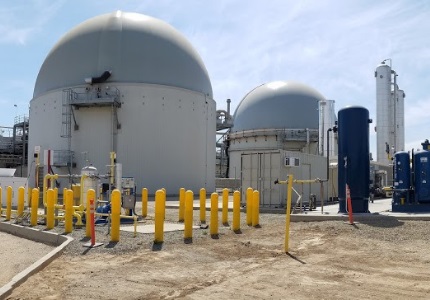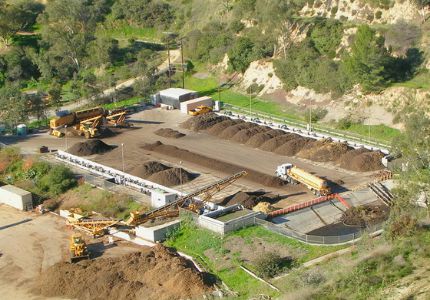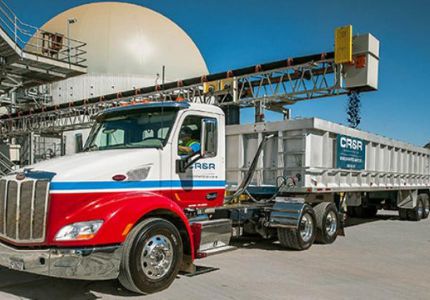Organics Waste Recovery and Recycling Activities
An organic waste recovery activity includes any facility, operation, or other activity that (14 CCR section 18983.1(b)) constitutes a reduction of landfill disposal. These include recycling organic materials through composting and in-vessel digestion activities. Composters and anaerobic digestors transform clean streams of yard and food waste into beneficial products through controlled decomposition processes.
Composting is the controlled aerobic decomposition of organic material such as:
- Leaves
- Twigs
- Grass clippings
- Food scraps
Aerobic means with oxygen. Compost and mulch provide many direct and indirect benefits when utilized in landscaping and as a component of systems and treatments designed for carbon sequestration, erosion control, fire remediation, stormwater management, and other uses.
Anaerobic digestion (AD) is the biological decomposition of organic matter with little or no oxygen. AD facilities produce biofuel and electricity.
Additional Activities that May Constitute a Reduction in Landfill Disposal
Beginning January 1, 2022, the law (14 CCR section 18983.2) enables CalRecycle to consider whether additional technologies or processes not listed or in 14 CCR Section 18983.1 constitute a reduction in landfill disposal.
For technologies or processes to count as a reduction in landfill disposal, they must have a permanent greenhouse gas emissions reductions equivalent to those achieved by composting the same organic waste.
For additional information and application requirements, visit the Determination of Technologies that Constitute a Reduction in Landfill Disposal webpage.
Composting and In-Vessel Digestion Operations and Facility Requirements
SB 1383 resulted in changes to Title 14 CCR, Division 7, Chapter 3.1 and Chapter 3.2. The following is a brief summary of those changes.
Once incoming feedstock is received, facility or operation (facility) operators remove material that is not compatible with the composting process so that their final product is marketable. Material removed after processing sent to disposal is residual waste. Operators are required to measure the amount of organic waste in the residual waste sent for disposal and report the percentage to CalRecycle every quarter.


Facility Operator Requirements
Facility operators are also required to maintain records including, but not limited to:
- Sampling results
- Incoming weights of material received
- Outgoing weights of material sent to disposal
- Outgoing weights of compost or chipped and ground material produced
- Outgoing weights of compostable material sent offsite to any destinations other than permitted solid waste facility or operation
In-Vessel Digestion Operation Requirements
In-Vessel Digestion Operations and Facilities are also required to:
- Send digestate for additional processing or composting only to a transfer/processing facility or operations that meets the incompatible material limit or a composting facility or operation that demonstrates the percentage of organic waste sent to disposal are within organic fraction limits

For more information contact: Short-Lived Climate Pollutants (SLCP), Organic Waste Methane Emissions Reductions, SLCP.Organics@calrecycle.ca.gov
